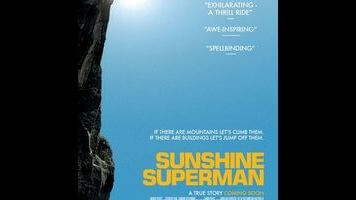Acrophobics need not apply to Marah Strauch’s documentary about the late Carl Boenish, the father of the modern BASE jumping movement. Nor should people who like their nonfiction movies better than middling.
It’s clear there’s a compelling story to be told: Boenish was the very definition of a free spirit, and the archival footage of him here reveals an effusive man who embraced life by consistently risking death. Eschewing the 9-to-5 office life early on, Boenish moved into aerial cinematography; he oversaw the filming of all the skydiving sequences in John Frankenheimer’s 1969 parachutist drama The Gypsy Moths, starring Burt Lancaster, Deborah Kerr, and Gene Hackman.
Eventually, he and a growing cadre of enthusiasts turned their attention to performing and photographing jumps from earthbound structures (the acronym they eventually came up with stands for “Building, Antenna, Span, and Earth”). They began with a series of (not always legal) leaps from the El Capitan rock formation in Yosemite National Park, which are the film’s most vertigo-inspiring sequences. When Boenish demonstrates the makeshift, cliffside ladder he concocted to get a better filming angle, even the bravest viewers may find their heads spinning.
It was during the El Capitan jumps that Boenish met his significant other, Jean, the film’s main interviewee. Many in his circle initially viewed Jean as an outsider, since she had never entertained the thought of parachuting before meeting her husband. But she quickly proved herself to be an accomplished leaper and an essential partner in Boenish’s quest to legitimize BASE jumping.
By herself, Jean is a fascinating subject whose words need little visual adornment. Anytime she’s on-screen, whether in images from past or present, something of her husband’s soulfulness is apparent. She’s a prime example of someone who has been completely reshaped by the person they love, as Boenish was by her. It’s both alarming and exhilarating to watch as they pursue this extreme passion together, jumping from big-city high-rises and remote bridges, cheerily proselytizing for the sport’s euphoric effects, and finally journeying to Norway’s Trolltindene mountain range for a series of jumps that would end in both record-breaking triumph and soul-shattering tragedy.
Strauch’s direction, in contrast, is numbingly uninspired, adhering stringently to the Doc. 101 assembly-line template cultivated by the film’s executive producer Alex Gibney. This means a lot of on-the-nose and/or sentimentalizing musical cues (selections from Wagner’s Tristan And Isolde; the Donovan ditty that gives the movie its name), as well as cheesy reenactments of key events (scenes in which Strauch herself plays Jean) meant to break up any talking-head monotony, but instead distract with their gauzy amateurism. The subjects themselves may soar, but the film that contains them remains frustratingly earthbound.









































